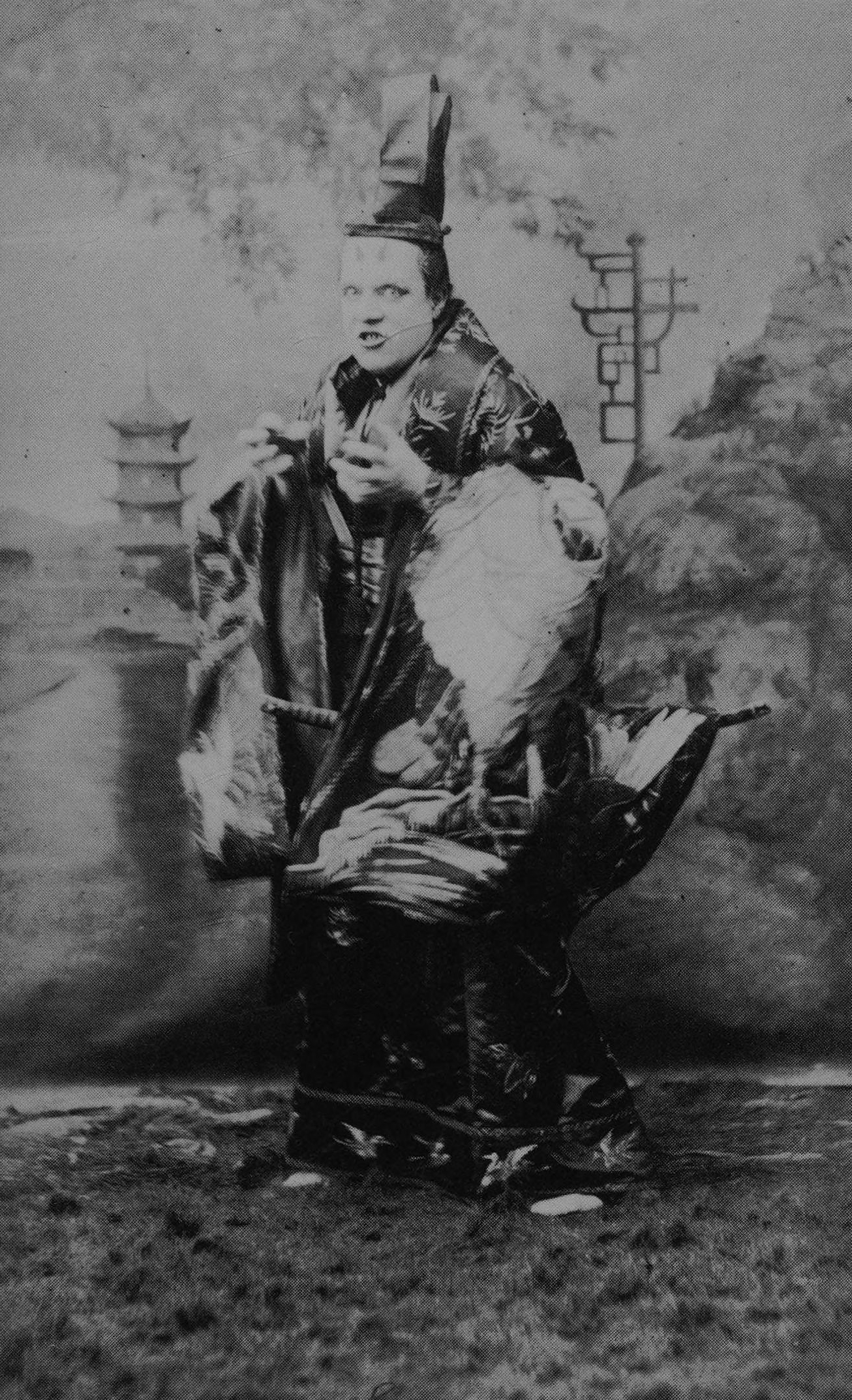From every kind of man
The Mikado, Act II
Obedience I expect;
I’m the Emperor of Japan —”
During fighting at Armentières on 9th February 1916 my Grandfather, George Edward Lines, was wounded in the leg and sent back to England to recover.
By April he was in Keynsham, staying with the Stevens family, where a local group were putting together two performances of The Mikado, the first held on the 26th April 1916.
As described in the following notice from The Western Daily Press of 27th April 1916, Grandpa was cast in the title role of The Mikado. (The picture is of Richard Temple, not Grandpa).
A successful performance
The inhabitants of Keynsham, in order to afford pecuniary help at the present crisis, organised two performances of “The Mikado, or the Town of Titipu” in aid of the Parish Nurse Fund and the Red Cross Fund. The first of these performances took place last night, and the Drill Hall was crowded by an appreciative audience. The characters were assumed as follows: – The Mikado of Japan, Mr G. E. Lines; Nanki-Poo (his son, disguised as a wandering minstrel, and in love with Yum-Yum), Mr James. W. Brody; Ko-Ko (Lord High Executioner of Tititipu), Mr E. MacVitie; Pooh-Bah (Lord High Everything Else). Mr Sidney Fairclough; Pish-Tu (a noble lord), Mr Gus Harvey; Yum-Yum, Miss Daisy Hedges; Pitti-Sing, Miss Dorothy Richardson; and Peep-Bo, Miss Rebecca Pierce (three sisters, wards of Koko); Katisha (an elderly lady, in love with Nanki-Poo), Mrs MacVite. There was a numerous and efficient chorus of of school girls and nobles, composed of those resident in Keynsham and the neighbourhood; and the orchestra of competent players was conducted by Mr. F. H. Weight. This Gilbert and Sullivan example was heard under favourable conditions, so that the combined efforts of the two brilliant contributors to the stage made their mark in Keysham as elsewhere. The author’s peculiar ingenuity and the composer’s rich gift of melody in this and other favourite works acted and reacted upon one another, combining to produce a kind of entertainment which at that time was unlike any other presented on the stage. In all its most characteristic features one Gillbert-Sulllivan comic opera can be compared only with another; and perhaps the predecessor with which “The Mikado” has most affinity is “Patience”. Where “Patience” was aesthetic, “The Mikado” is as Japanese as its title suggests. It need hardly be said that Sir Arthur Sullivan, with his happy facility for suiting the expression to the theme, took the opportunity to give a suggestion of local colouring to his music. He affords now and then a hint of the minor key characteristic of nearly all barbaric melody. For the rest there are plenty of solos and concerted numbers that have obtained the popularity deserved by their intrinsic grace and charm. The foundation of the plot is that musical Nanki-Poo is in love with Yum-Yum, the ward and betrothed wife of the Lord High Executioner Ko-Ko, who was originally a cheap tailor, and was condemned to death for flirting, but has been raised by his fellow citizens to his present rank. The more noticeable features of the opera were characteristically rendered by the Keynsham vocalists, and some of them had to be repeated in obedience to the hearty applause. Nanki-Poo’s song “A wandering minstrel I.” was enthusiastically encored. Poo-Bah’s song, respecting those “on the list” was another highly acceptable item. The delightful quartet, “Brightly dawns our wedding day” with a refrain in old madrigal style, the bright and pleasing duet for Ko-Ko and Poo-Bah, and a comic song about a love-sick tomtit, were among the specially delightful numbers. The scenery deserved commendation, and the picturesque dresses were highly effective. The large audience had the gratification of listening to a bright work capitally interpreted, as well as knowing they were substantially assisting two noble objects.
A more humane Mikado never
The Mikado Act II
Did in Japan exist,
To nobody second,
I’m certainly reckoned
A true philanthropist.
It is my very humane endeavour
To make, to some extent,
Each evil liver
A running river
Of harmless merriment.”

Hey there, this might sound weird, but I have an old Kodak video camera on whose booklet there is a signature which seems to say Geo. E Lines. Searching on Google, your block came up. Any chance you can help me identifying the signature? Maybe it’s your relative’s…. Thanks!